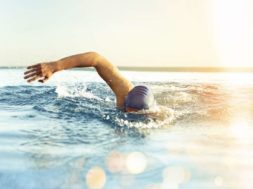“You have to learn the rules of the game. And then you have to play better than anyone else. ” – Albert Einstein.
After some time pondering this quote from Einstein, I realized that Einstein was not just referring to a game of sports, but also life and work experiences. My lifestyle choice as a swimmer started when I was around 12 years old. I grew up on a farm in the middle of nowhere and swimming, just meant cooling off in the river on our farm. The farm was too far from town in order for us to be High school day students. Going to High school meant boarding school.
In my first year of High school, I did gymnastics, but hurt my ankle and I felt doomed as I really would have liked to take gymnastics further. Physical Training back in the seventies meant just that – all kids in the school regardless of ability had to run around the field, play rugby, do athletics, swim, gymnastics, hockey and whatever other sport was available. (I believe nowadays it is optional in schools to play sports).
The school’s swimming pool did not have heaters, which resulted in swimming being a summer-only activity as the winters were quite cold. There was also no swim team 1978 and in general, most of the female students looked for a way out of swimming. It was not the case for me – I was in heaven as soon as my body hit the water.
This is where my love for water and swimming started. At first, it was just swimming for the hour odd during PT. Our routine in Boarding school included afternoon rest, study hall, an hour of sport, showering, dinner, late study and lights out – of course for each activity a bell rang. As a water addict, the hour of swimming in PT was just not enough for me. I wanted more, so when all the athletes went to the athletic field, I went back to the pool on my own to get some more training. There were no Coach, no program, just the pool and endless laps which I swam.
Soon the two sessions a day were also not enough and I started staying after school for the rest break before study hall. 45-minute training session, rush off to make study hall just in time. The Western Province in South Africa is a very hot and dry place in summer. We did not have the luxury of air conditioners in study hall, just those huge roof fans that go “Whoop, whoop” all the time and barely cool anybody down. Swimming for 45 minutes before study hall was great – while everybody else was sweating, I felt refreshed and could concentrate on studying in the heat.
One day during one of my training sessions, a teacher arrived at the school’s swimming pool with her two boys, aged around 7 and 5. I felt a sinking feeling in my stomach (the type you get when you are in a lift) when the teacher arrived and I thought she was going to report me to the Boarding school’s Principal. To my surprise, we started talking and she said that she completed a coaching course, so if I want to, I could train with her two boys. That was music to my ears. The rest became history.
That was 37 years ago. The only times that I did not swim in these 37 years, were when I had injuries, broke fingers, a broken leg and expected my baby. Oh, not to forget the times I left at 2 am for work and got home only at 21:00 pm that night as a representative. Needless to say, I took to the pool at every opportunity I could regardless of the circumstances, depending on pool availability of course.
Reflecting on this lifetime of swimming, professional life and now the job title of Swim Mom, I realize that swimming brings more to the table than just being active, feeling good due to exercise and, of course, controlling weight. Swimming success leads to other success in life. You just need to love the sport and in my opinion, it will contribute to your lifestyle, career and everything else in the following ways:
- Set goals and objectives and work towards achieving it.
- Plan your life and live your plan.
- Do not procrastinate.
- Keep records and interpret results.
- Adjust your plan if and when needed.
- Swim faster and you have more time for rest – work smart and you will have spare time for personal pursuits.
- Do it properly, then it is easy – whichever task you undertake, normally, if you work smart and work correctly it makes the job easier. If you execute strokes correctly, it will make the distances you have to train easier.
- Keep your routine.
- Do what you love.
- Enjoy whatever you do and the results will speak for itself.





